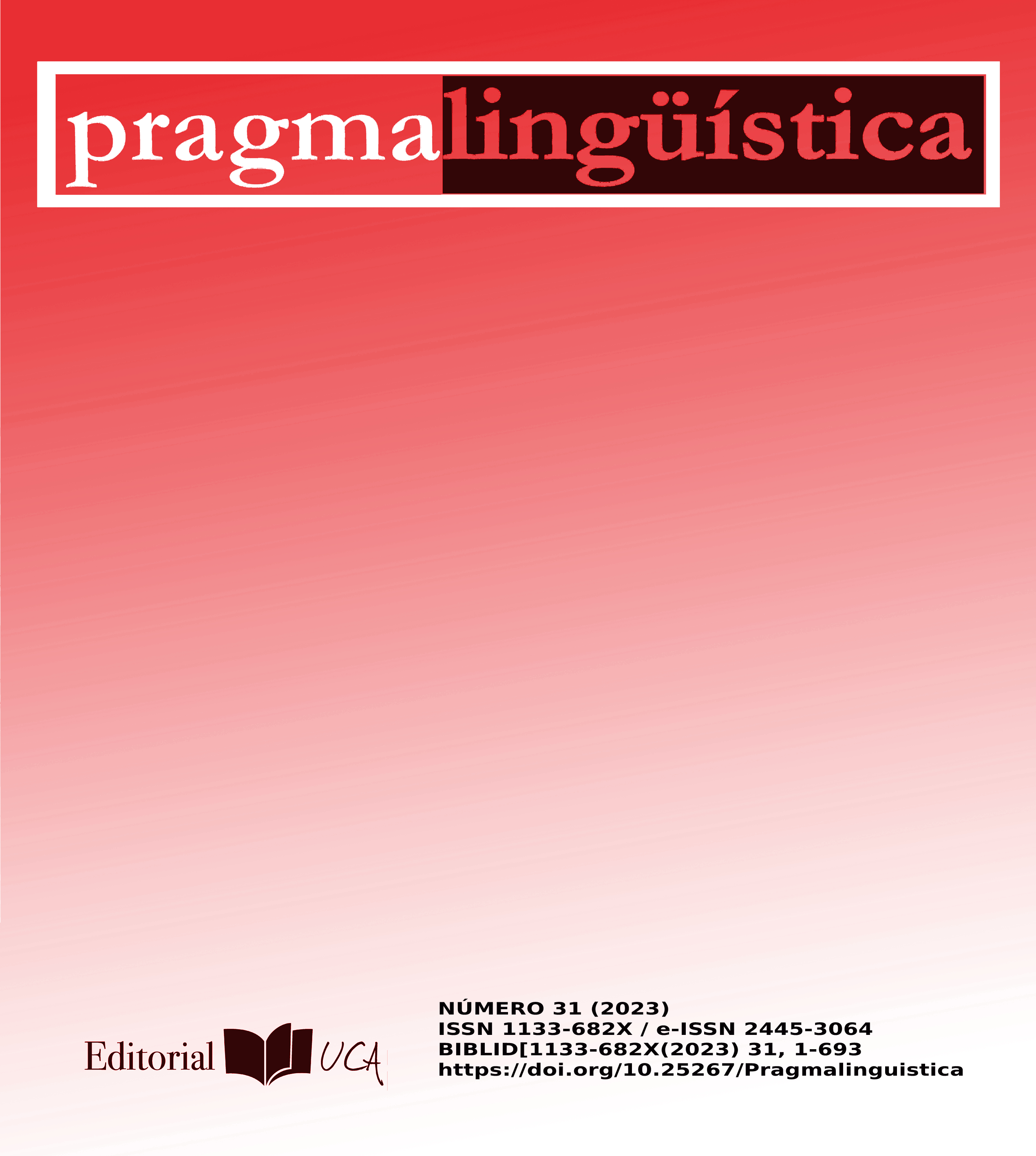Discrepancias sintáctico-semánticas en la modificación adjetival inglesa

DOI
https://doi.org/10.25267/Pragmalinguistica.2023.i31.04Información
Resumen
Tanto la filosofía positivista (Frege, 1879, 1892) como la filosofía analítica (Russell, 1905, 1940; Quine, 1953, 1960) sostienen que la forma superficial de muchas expresiones lingüísticas no revela de manera óptimamente transparente todas sus posibilidades y capacidades de significación. En las lenguas naturales es manifiesta la existencia de discrepancias en la composición entre la estructura sintáctica de determinadas oraciones y su correspondiente estructura semántica. Parece que el modo en que se componen en el nivel de la forma superficial no corresponde paralelamente con el modo en que se componen en el nivel del significado (Huang, 1982; May, 1985; Sportiche, 1988). Partiendo de estas consideraciones teóricas, nos atrevemos a elaborar el presente trabajo sobre la modificación adjetival inglesa. En este artículo analizaremos los adjetivos de orientación agentiva y los adjetivos de voluntad, y demostraremos que la configuración sintáctica de las oraciones donde participan no se corresponde de manera biunívoca con su interpretación semántica.
Palabras clave
Descargas
Cómo citar
Licencia
Derechos de autor 2023 Luis Manuel Estudillo Díaz

Esta obra está bajo una licencia internacional Creative Commons Atribución-NoComercial-SinDerivadas 4.0.
Citas
BOLINGER, D. (1967): “Adjectives in English: Attribution and predication”, Lingua, 18, pp. 1-34.
CARLSON, G. (1977): References to Kinds in English (Ph.D. dissertation), University of Massachussetts at Amherst.
CINQUE, G. (1999): Adverbs and Functional Head. A Cross-Linguistics Perspective, New York: Oxford University Press.
COMESAÑA RINCÓN, J. (1993): “Notas a una pseudo-conversión sintáctica en inglés. Adjetivos pseudo(-in-)transitivos III”. RESLA, 9, pp. 37-48.
CRUSE, A. (2000): Meaning in Language: An Introduction to Semantics and Pragmatics, Oxford: Oxford University Press.
CULICOVER, P. (1997): Principles and Parameters: An Introduction to Syntactic Theory, New York: Oxford University Press.
CHOMSKY, N. (1986): Barriers, Cambridge, Massachussetts: MIT Press.
ESCANDELL-VIDAL, V. (2018): “Evidential commitment and feature mismatch in Spanish estar constructions”. Journal of Pragmatics. 128, pp. 102-115.
FERRIS, C. (1993). The Meaning of Syntax: A Study in the Adjectives of English, Singapore: Longman.
FREGE, G. (1879): Begriffsschrift, Halle: Verlag Louis Nebert. Traducido al inglés en J. van Heijenoort (1967): From Frege to Gödel: A Sourcebook in Mathematical Logic, 1879-1931, Cambridge, Massachussetts: Harvard University Press.
FREGE, G. (1892): “Über Sinn und Bedeutung”, Zeitschrift für Philosophie und philosophische Kritik, 100, pp. 25-50. Traducido al inglés en P. Geach and M. Black (1980): Translations from the Philosophical Writings of Gottlob Frege, Oxford: Blackwell.
GARCÍA NÚÑEZ, J. M. (1999): Semántica de los Adverbios Temo-dependientes, Cádiz: Servicio de Publicaciones de la Universidad de Cádiz.
GRICE, H. P. (1975): “Logic and Conversation”, Cole, P. y Morgan, R. (eds.), Syntax and Semantics 3: Speech Acts, New York: Academic Press, pp. 41-58.
HORNSTEIN, N. (1995): Logical Form: From GB to Minimalism, Cambridge, Massachussetts: MIT Press.
HUANG, J. (1982): “Move WH in a Language without Wh-Movement”, The Linguistic Review, 1, pp. 269-416.
JACKENDOFF, R. (1972): Semantic Interpretation in Generative Grammar, Cambridge, Massachussetts: MIT Press.
JACKENDOFF, R. (2010): Meaning and the Lexicon: The Parallel Architecture 1975-2010. Oxford; Oxford University Press.
KRATZER, A. (1995): “Stage-Level and Individual-Level Predicates”, Carlson, G. y Pelletier, F. J. (eds.), The Generic Book, Chicago: University of Chicago Press, pp. 125-175.
LARSON, R. K. (2000): “ACD in AP?”. Paper presented at the 19th West Coast Conference of Formal Linguistics (WCCFL 19). Los Angeles, CA.
LEES, R.B. (1960): “A multiply ambiguous adjectival construction in English”, Language, 36, pp. 207-221.
MAY, R. (1985): Logical Form: Its Structure and Derivation, Cambridge, Massachussetts: MIT Press.
OJEA LÓPEZ, A. (1998): “On the Eventive Structure of Adjectives and Adverbs”, Atlantis, 20, pp. 159-177.
PUSTEJOVSKY, J. (1995): The Generative Lexicon, Cambridge, Massachussetts: MIT Press.
QUINE, W. V. (1953): From Logical Point of View, Cambridge, Massachussetts: Harvard University Press.
QUINE, W. V. (1960): Word and Object, Cambridge, Massachussetts: MIT Press.
QUIRK, R., S. GREENBAUM, G. LEECH & SVARTVIK, J. (1985): “Complements of verbs and adjectives”, A Comprehensive Grammar of the English Language. London: Longman, pp. 1147-1223.
RADFORD, A. (1988): Transformational Grammar, Cambridge: Cambridge University Press.
RAPOPORT, T. R. (1991): “Adjunct-Predicate Licensing and D-Structure”, Rothstein, S. (ed.), Syntax and Semantics, 25: Perspectives on Phrase Structure: Heads and Licensing, New York: Academic Press, pp. 159-187.
ROBERTS, I. (1987): The Representation of Implicit and Dethematized Subjects, Foris: Dordrecht.
RUSSELL, B. (1905): “On Denoting”, Mind, 14, pp. 479-493.
RUSSELL, B. (1940): An Inquiry into Meaning and Truth, London: Allen and Unwin.
SAG, I. (1976): Deletion and Logical Form (Ph.D. dissertation), Cambridge, Massachussetts: MIT Press.
SHAER, B. (2000): “Syntactic Positions and the Readings of ‘Manner’ Adverbs”, Fabricius-Hansen, C., Lang, E. y Maienborn, C. (eds.), Approaching the Grammar of Adjuncts. ZAS Papers in Linguistics, 17, pp. 265-287.
SPERBER, D y WILSON, D. (1986): Relevance: Communication and Cognition, Oxford: Blackwell.
SPORTICHE, D. (1988): “A Theory of Floating Quantifiers and its Corollaries for Constituent Structure”, Lingustic Inquiry, 19, pp. 425-449.
TRAVIS, L. (1988): “The Syntax of Adverbs”, McGill Working Papers in Linguistics. Special Issue on Comparative Germanic Syntax, Montreal: McGill University, pp. 280-310.
WYNER, A. (1994): Boolean Event Lattices and Thematic Roles in the Syntax and Semantics of Adverbial Modification (Ph.D. dissertation), Ithaca, New York: Cornell University.
ZUBIZARRETA, M. L. (1982): Levels of Representation in the Lexicon and in the Syntax, Foris: Dordrecht.






